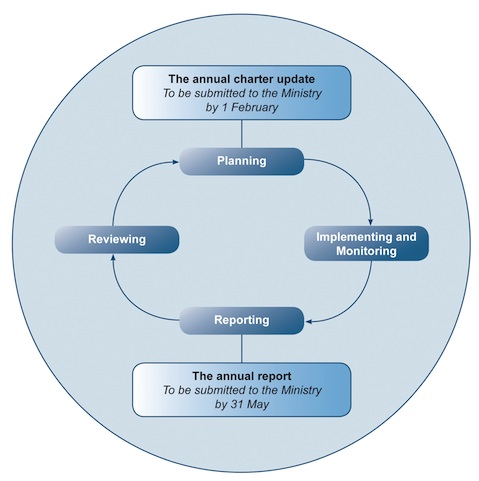Embedding planning within self-review
Planning has a central role in school and kura self-review. It involves two key documents – the charter and the annual report. The charter outlines the long-term vision, goals, direction, and targets, and the plans for achieving them. The annual report informs the community and Ministry of Education how the school or kura is doing in relation to its goals and targets and what has or hasn’t been effective in lifting progress and achievement. Self-review is ongoing: these two documents guide and maintain its focus on continuous improvement. They specify which learners are making expected progress, which need more support, what is being done to provide it, and how progress is being measured.
The ongoing cycle of self-review: Reviewing; planning; implementing and monitoring; reporting
Curriculum goals
The national curriculum documents, The New Zealand Curriculum and Te Marautanga o Aotearoa, envision our young people as competent and confident lifelong learners, connected and secure in their identities, and able to contribute to our country and beyond. Schools and kura, with their students, parents, whānau, and communities, develop their goals and targets in relation to these curriculum outcomes.
A kura or school’s charter documents its longer term goals and specific targets for raising student achievement across the curriculum. It states the actions the school or kura will take to achieve these goals and targets and describes how it will monitor progress against them.
Schools and kura report to parents on students’ curriculum learning and achievement, including their progress in the key competencies. In years 1–8, the National Standards and Ngā Whanaketanga Rumaki Māori provide reference points or progressions for literacy and numeracy learning within the broader kura or school curriculum.
In their annual reports to their communities and to Government, schools and kura also report kura- or school-wide information against the specific targets they have set for raising student achievement.
Opotiki College: Planning for success
Planning at Opotiki College exemplifies a strong self-review culture that has led to the predominantly Māori learners at this decile 1 school achieving at or above national averages in NCEA.
We believe our students can do as well as students anywhere in the country. We prove this with our results year after year.
Maurie Abraham, Principal
One of the school’s strategic goals is to provide a relevant, progressive, and innovative curriculum that meets the needs of all. A purpose-built “curriculum planner” collates information to monitor progress, enhance achievement, and show the relationships between classroom teaching and student learning. Departmental teams revise the school’s curriculum in an ongoing process linked to professional development and appraisal. Teachers also meet in three-weekly cross-curricular professional learning groups to reflect on effective teaching in a diverse classroom, the key competencies, and teaching as inquiry.
In the past, the school had a separate strategic plan for improving Māori student achievement, developed and monitored by the Māori Teachers’ Forum. Today the strategic planning for Māori is incorporated within school-wide planning. The Māori Teachers’ Forum, which holds regular hui with whānau, actively monitors the outcomes for Māori learners, both in English-medium settings and in the bilingual unit.
In line with Ka Hikitia, the school focuses on te reo Māori and tikanga, on reinforcing Māori identity, and on student presence and engagement. It supports this focus by participating in Te Kotahitanga and implementing, in partnership with the community, a restorative justice programme. All outcomes are carefully monitored. For example, the attendance strategy focuses on Māori learners in years 9 and 10. School leaders, teachers, and whānau co-operate to meet the targets. Tracking and reporting systems ensure that unexplained absences are followed up immediately.
Opotiki College’s approach to ensuring educational success for Māori learners is described at Educational leaders: Rangiātea - Opotiki College.

